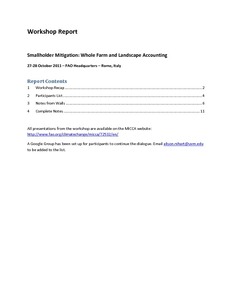Focal point
Location
The Food and Agriculture Organization of the United Nations leads international efforts to defeat hunger. Serving both developed and developing countries, FAO acts as a neutral forum where all nations meet as equals to negotiate agreements and debate policy. FAO is also a source of knowledge and information. We help developing countries and countries in transition modernize and improve agriculture, forestry and fisheries practices and ensure good nutrition for all. Since our founding in 1945, we have focused special attention on developing rural areas, home to 70 percent of the world's poor and hungry people.
Members:
Resources
Displaying 2511 - 2515 of 5074Highlands and Drylands : Mountains, a source of resilience in arid regions
Dryland mountains are among the least-known environments in the world, and certainly one of the most overlooked by decision- and policy-makers. Dryland mountains have an outstanding strategic value. They act as water towers for surrounding dry lowland areas, as shown by the examples of the Rocky Mountains of North America, the Central Andes, the mountains of the Mediterranean Basin, the Sahara and Sub-Saharan Africa, West Asia, and Central Asia
Sustainable Land Management in Practice. Guidelines and Best Practices for Sub-Saharan Africa
These guidelines have been developed based on FAO’s and WOCAT’s extensive experience. The book draws, in particular, on WOCAT’s network and its database of SLM knowledge - as well as on WOC AT’s first overview book entitled ‘Where the land is greener’. These guidelines were implemented in the framework of the TerrAfrica partnership, whose main objective is to mainstream and upscale SLM in SSA, through the leveraging and harmonising of multisectoral investments at the local, country, subregional and regional levels.
Land policy in Africa : West Africa regional assessment
The report considers the critical issues providing the context for discussing land issues affecting West Africa as a region. These include the political, social and economic context, colonial legacy and legal plural systems, the operations of regional economic communities and other regional initiatives, impact of demography, migration and urbanization, conflicts and post-conflict issues, as well as shared resources and ecosystems.
Moving Forward
In this 2012 edition of Moving Forward, FAO Forestry is pleased to present a selection of the work it undertook in the 2010-2011 biennium for the benefit of the global forestry community. The FAO Forestry Programme encompasses a vast range of activities and projects, of which this booklet presents only a sample. In all regions of the world, the Programme is helping to implement sustainable forest management and boost the livelihoods of forest-dependent people. It does this, in part, by improving information on forests.
CCAFS/FAO Expert Workshop on Smallholder Mitigation: Whole Farm and Landscape Accounting. Rome, 27-28 October 2011. Workshop Summary
Summary Report from the workshop held in Rome 27-28 October 2011










